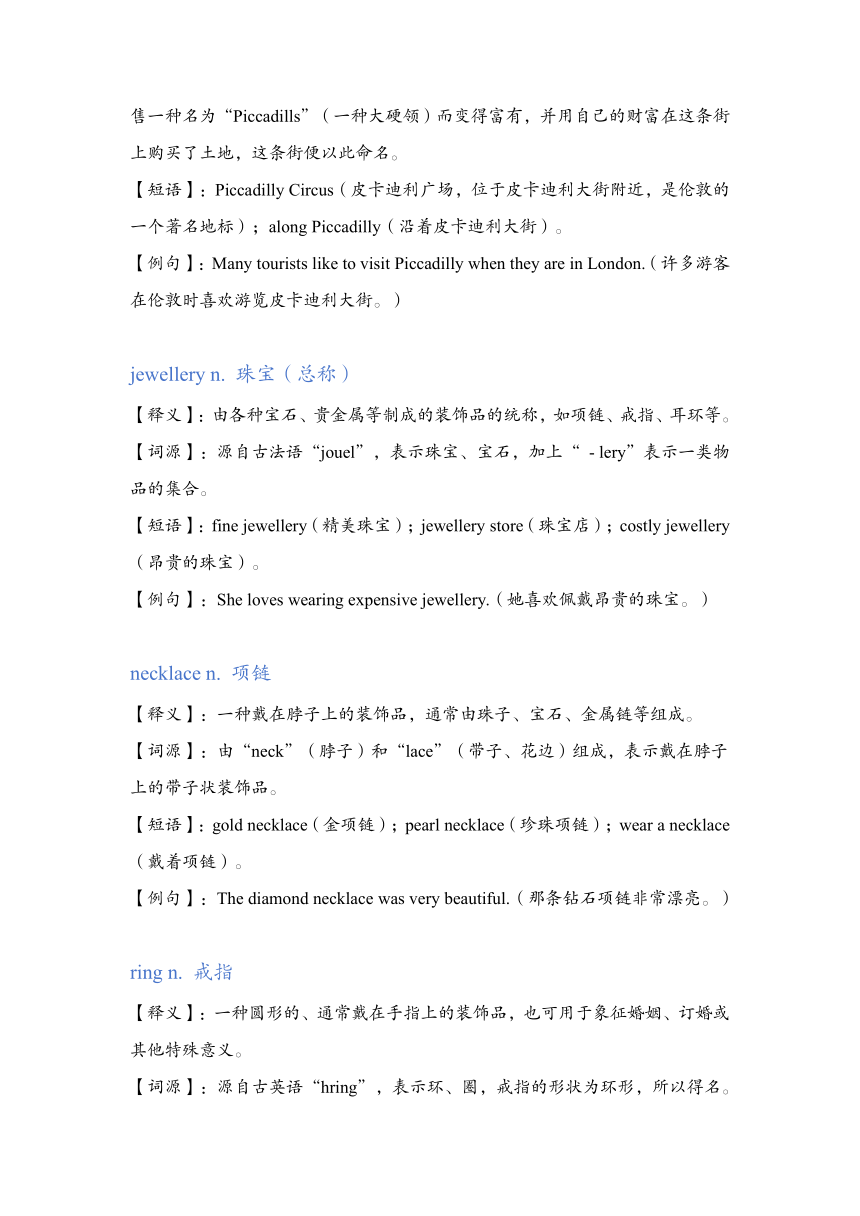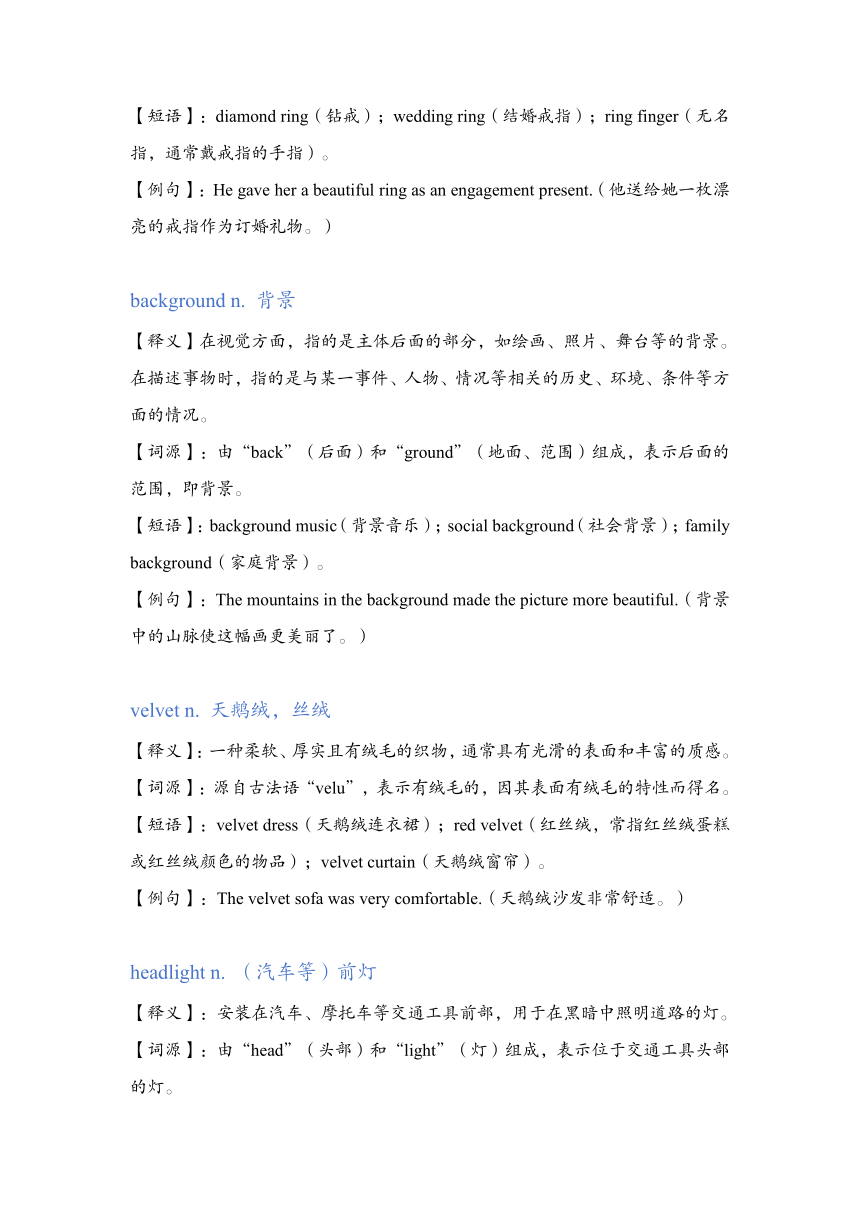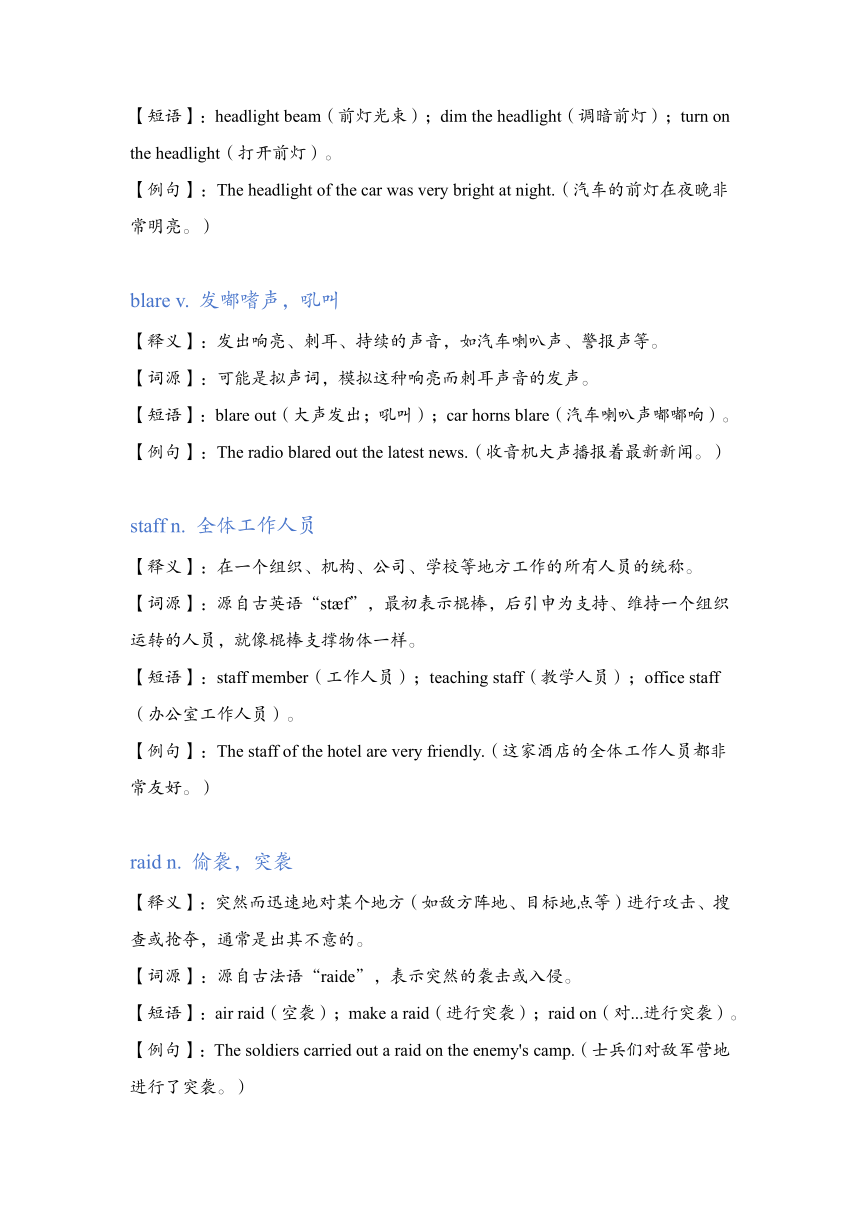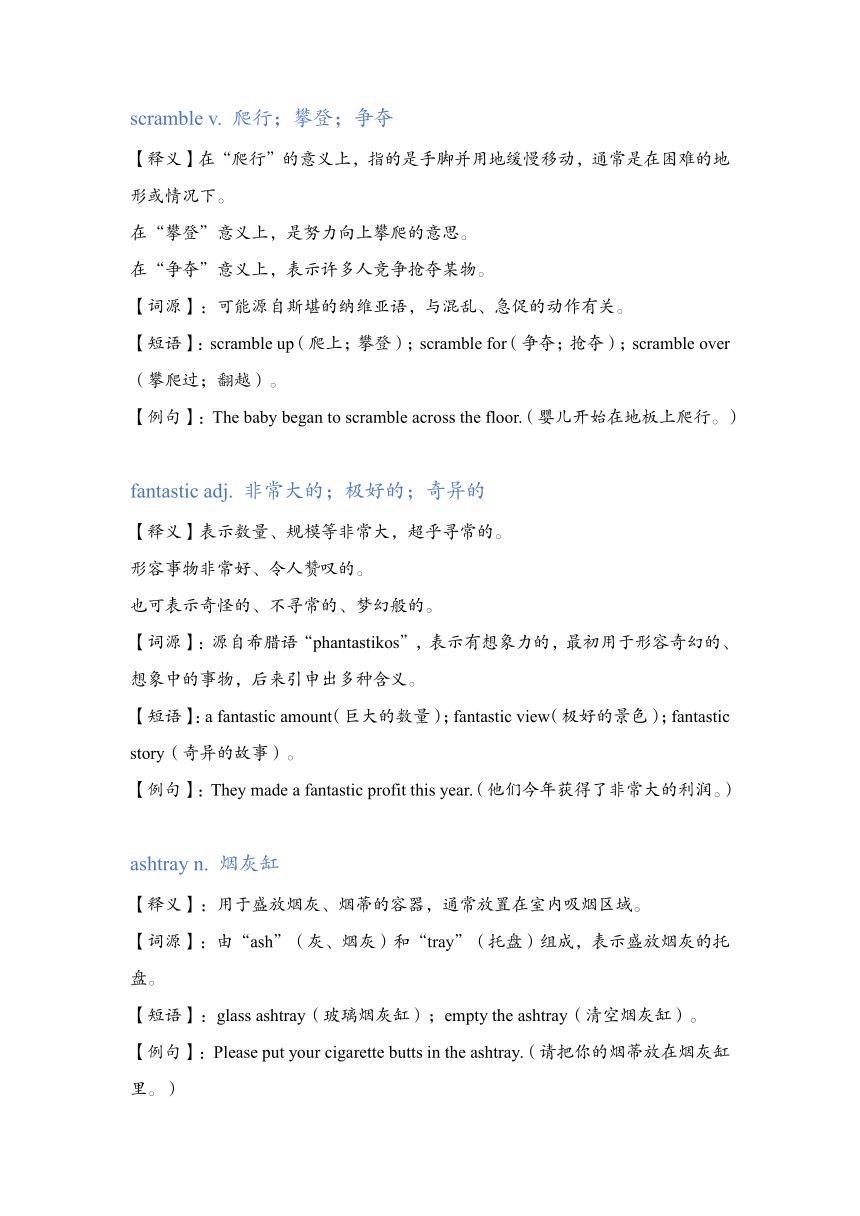新概念第三册Lesson 6 The facts讲义
文档属性
| 名称 | 新概念第三册Lesson 6 The facts讲义 |  | |
| 格式 | docx | ||
| 文件大小 | 171.8KB | ||
| 资源类型 | 教案 | ||
| 版本资源 | 新概念英语 | ||
| 科目 | 英语 | ||
| 更新时间 | 2024-12-04 14:06:13 | ||
图片预览





文档简介
新概念第三册
Lesson 6 The facts
单词精讲
smash-and-grab n. 砸橱窗抢劫
【释义】:一种抢劫方式,通常是犯罪分子通过砸破商店的橱窗或玻璃门,然后迅速抢夺店内的财物后逃离现场。
【词源】:由“smash”(砸、粉碎)和“grab”(抢夺、攫取)组合而成,形象地描述了这种犯罪行为的动作特点。
【短语】:a series of smash - and - grabs(一系列砸橱窗抢劫事件);prevent smash - and - grab(防止砸橱窗抢劫)。
【例句】:There has been an increase in smash - and - grab incidents in the city center.(市中心砸橱窗抢劫事件有所增加。)
arcade n. 有拱廊的街道(两旁常设商店)
【释义】:街道两旁有连续拱廊的地方,这些拱廊下通常设有各种商店,是一种具有特色的商业街道形式。
【词源】:源自拉丁语“arcus”,表示拱形、拱顶,这种街道因有拱形结构而得名。
【短语】:shopping arcade(购物拱廊街);arcade games(街机游戏,因最初多设置于这种拱廊街道而得名)。
【例句】:We strolled along the arcade, looking at the various shops.(我们沿着有拱廊的街道漫步,看着各种各样的商店。)
Piccadilly n. 皮卡迪利大街
【释义】:是英国伦敦的一条著名大街,以其众多的商店、剧院、酒店和娱乐场所而闻名。
【词源】:名称来源于17世纪的一个裁缝店老板Robert Baker,他通过制作和销售一种名为“Piccadills”(一种大硬领)而变得富有,并用自己的财富在这条街上购买了土地,这条街便以此命名。
【短语】:Piccadilly Circus(皮卡迪利广场,位于皮卡迪利大街附近,是伦敦的一个著名地标);along Piccadilly(沿着皮卡迪利大街)。
【例句】:Many tourists like to visit Piccadilly when they are in London.(许多游客在伦敦时喜欢游览皮卡迪利大街。)
jewellery n. 珠宝(总称)
【释义】:由各种宝石、贵金属等制成的装饰品的统称,如项链、戒指、耳环等。
【词源】:源自古法语“jouel”,表示珠宝、宝石,加上“ - lery”表示一类物品的集合。
【短语】:fine jewellery(精美珠宝);jewellery store(珠宝店);costly jewellery(昂贵的珠宝)。
【例句】:She loves wearing expensive jewellery.(她喜欢佩戴昂贵的珠宝。)
necklace n. 项链
【释义】:一种戴在脖子上的装饰品,通常由珠子、宝石、金属链等组成。
【词源】:由“neck”(脖子)和“lace”(带子、花边)组成,表示戴在脖子上的带子状装饰品。
【短语】:gold necklace(金项链);pearl necklace(珍珠项链);wear a necklace(戴着项链)。
【例句】:The diamond necklace was very beautiful.(那条钻石项链非常漂亮。)
ring n. 戒指
【释义】:一种圆形的、通常戴在手指上的装饰品,也可用于象征婚姻、订婚或其他特殊意义。
【词源】:源自古英语“hring”,表示环、圈,戒指的形状为环形,所以得名。
【短语】:diamond ring(钻戒);wedding ring(结婚戒指);ring finger(无名指,通常戴戒指的手指)。
【例句】:He gave her a beautiful ring as an engagement present.(他送给她一枚漂亮的戒指作为订婚礼物。)
background n. 背景
【释义】在视觉方面,指的是主体后面的部分,如绘画、照片、舞台等的背景。
在描述事物时,指的是与某一事件、人物、情况等相关的历史、环境、条件等方面的情况。
【词源】:由“back”(后面)和“ground”(地面、范围)组成,表示后面的范围,即背景。
【短语】:background music(背景音乐);social background(社会背景);family background(家庭背景)。
【例句】:The mountains in the background made the picture more beautiful.(背景中的山脉使这幅画更美丽了。)
velvet n. 天鹅绒,丝绒
【释义】:一种柔软、厚实且有绒毛的织物,通常具有光滑的表面和丰富的质感。
【词源】:源自古法语“velu”,表示有绒毛的,因其表面有绒毛的特性而得名。
【短语】:velvet dress(天鹅绒连衣裙);red velvet(红丝绒,常指红丝绒蛋糕或红丝绒颜色的物品);velvet curtain(天鹅绒窗帘)。
【例句】:The velvet sofa was very comfortable.(天鹅绒沙发非常舒适。)
headlight n. (汽车等)前灯
【释义】:安装在汽车、摩托车等交通工具前部,用于在黑暗中照明道路的灯。
【词源】:由“head”(头部)和“light”(灯)组成,表示位于交通工具头部的灯。
【短语】:headlight beam(前灯光束);dim the headlight(调暗前灯);turn on the headlight(打开前灯)。
【例句】:The headlight of the car was very bright at night.(汽车的前灯在夜晚非常明亮。)
blare v. 发嘟嗜声,吼叫
【释义】:发出响亮、刺耳、持续的声音,如汽车喇叭声、警报声等。
【词源】:可能是拟声词,模拟这种响亮而刺耳声音的发声。
【短语】:blare out(大声发出;吼叫);car horns blare(汽车喇叭声嘟嘟响)。
【例句】:The radio blared out the latest news.(收音机大声播报着最新新闻。)
staff n. 全体工作人员
【释义】:在一个组织、机构、公司、学校等地方工作的所有人员的统称。
【词源】:源自古英语“st f”,最初表示棍棒,后引申为支持、维持一个组织运转的人员,就像棍棒支撑物体一样。
【短语】:staff member(工作人员);teaching staff(教学人员);office staff(办公室工作人员)。
【例句】:The staff of the hotel are very friendly.(这家酒店的全体工作人员都非常友好。)
raid n. 偷袭,突袭
【释义】:突然而迅速地对某个地方(如敌方阵地、目标地点等)进行攻击、搜查或抢夺,通常是出其不意的。
【词源】:源自古法语“raide”,表示突然的袭击或入侵。
【短语】:air raid(空袭);make a raid(进行突袭);raid on(对...进行突袭)。
【例句】:The soldiers carried out a raid on the enemy's camp.(士兵们对敌军营地进行了突袭。)
scramble v. 爬行;攀登;争夺
【释义】在“爬行”的意义上,指的是手脚并用地缓慢移动,通常是在困难的地形或情况下。
在“攀登”意义上,是努力向上攀爬的意思。
在“争夺”意义上,表示许多人竞争抢夺某物。
【词源】:可能源自斯堪的纳维亚语,与混乱、急促的动作有关。
【短语】:scramble up(爬上;攀登);scramble for(争夺;抢夺);scramble over(攀爬过;翻越)。
【例句】:The baby began to scramble across the floor.(婴儿开始在地板上爬行。)
fantastic adj. 非常大的;极好的;奇异的
【释义】表示数量、规模等非常大,超乎寻常的。
形容事物非常好、令人赞叹的。
也可表示奇怪的、不寻常的、梦幻般的。
【词源】:源自希腊语“phantastikos”,表示有想象力的,最初用于形容奇幻的、想象中的事物,后来引申出多种含义。
【短语】:a fantastic amount(巨大的数量);fantastic view(极好的景色);fantastic story(奇异的故事)。
【例句】:They made a fantastic profit this year.(他们今年获得了非常大的利润。)
ashtray n. 烟灰缸
【释义】:用于盛放烟灰、烟蒂的容器,通常放置在室内吸烟区域。
【词源】:由“ash”(灰、烟灰)和“tray”(托盘)组成,表示盛放烟灰的托盘。
【短语】:glass ashtray(玻璃烟灰缸);empty the ashtray(清空烟灰缸)。
【例句】:Please put your cigarette butts in the ashtray.(请把你的烟蒂放在烟灰缸里。)
重点语法
如何运用常见的前缀
(1) dis-
agreeable disagreeable
content discontent
graceful disgraceful
honest dishonest
satisfactory dissatisfactory
(2) dis还可以加在名词前
agreement disagreement
honesty dishonesty
ability disability
grace disgrace
comfort discomfort
(3)dis可以加在动词前
agree disagree
appear disappear
believe disbelieve
(4)dis--还可表示除去、解除;在名词前加dis得到动词形式
courage discourage
root disroot
mask dismask
burden disburden
(5) il--加在以i开头的形容词之前
legal illegal
logical illogical
literate illiterate
(6)im--加在以b,m,p开头的形容词之前
possible impossible
mortal immortal
moral immoral
balanced imbalanced
(7)ir-加在以r开头的形容词之前
regular irregular
rational irrational
resistible irresistlble
(8)in--主要用于其它字母开头的词之前
human inhuman
correct incorrect
justice injustice
sincere insincere
(9)un--只能用于形容词和动词之前
译为:不
happy unhappy
friendly unfriendly
lucky unlucky
译为:无
conditional unconditional
limited unlimited
译为:非
official unofficial
just unjust
译为:未,主要用于过去分词之前
undecided unfinished
unexpected unhurt
用于动词之前表示做相反的动作
lock unlock
tie untie
cover uncover
pack unpack
dress undress
load unload
三、课文精讲
1. The expensive shops in a famous arcade near Piccadilly were just opening.皮卡迪利大街附近的一条著名拱廊街道上,几家高档商店刚刚开始营业。
Piccadilly, 皮卡迪利,这是伦敦市中心一条著名的街。这条街从海德公园通向一个著名的广场,叫作“皮卡迪利广场”。
2.The silence was suddenly broken when a large car, with its headlights on and its horn blaring, roared down the arcade.宁静突然被打破,一辆大轿车亮着前灯,响着喇叭,呼啸着冲进了拱廊街,
with its headlights on and its horn blaring.
这是 with引导的独立主格结构,在句中表示伴随状况。
with的复合结构:
(1)如果宾语和宾语补足语在逻辑上有主谓关系,应该采用动词的ing形式;
(2)如果是动宾关系,应该采用过去分词形式作宾补;
(3)如果是说明当时的情况,常用形容词、副词、介词短语表明宾语的状态
(4)如果表达某事将要展开发生,要用动词不定式to.
She sat staring into the distance with tears streaming down her cheeks.
She stood there with her hands resting on her hips
He ran into the room with his face covered with tears
With his hornework finished,he felt happy.
He used to sleep with all the windows open.
He went out with his hat on.
With the meeting over,we went home.
He came in with a knife in his hand.
Tow others with black stockings over their faces jumped out.
With a lot of work to do,he can't to to the cinema.
with用于句首或句尾,常表示状语、行为方式、原因、伴随状况等;
如果跟在名词之后,是用来修饰限定该名词
a thief with stocking over his face
a teacher with a book under his arm
a room with the windows open
3.It came to a stop outside the jeweller's.珠宝店门口停了下来。
come to 后面常接名词,表示达到
come to a stop,come to an end,come to a decision,
come to an agreement,come to an understanding,
come to success,come to fame
停车 stop,draw up ,pull up
the jeweller's 珠宝店
at the barber's,at the butcher's,
at the baker's,at the greengrocer's,
at the grocer's,at the stationer's,
at the tobacconist's,at the chemist's
4.One of the thieves was struck by a heavy statue, but he was too busy helping himself to diamonds to notice any pain.一个窃贼被一尊很重的雕像击中,但由于他忙着抢钻石首饰,竟连疼痛都顾不上了。
help oneself to: 自便 ,文章这里 help oneself to sth. 是“擅自取用,侵占某物”的意思。
My roommate helped herself to my clothes without asking me.
5. The raid was all over in three minutes, for the men scrambled back into the car and it moved off at a fantastic speed.这场抢劫只持续了3分钟,因为窃贼争先恐后地爬上轿车,以惊人的速度开跑了。
at a fantastic speed 以惊人的速度
at a tremendous speed
at a high(full)speed
with great speed.
6.They had got away with thousands of pounds worth of diamonds.他们已带着价值数千镑的首饰逃之夭夭了。
hundreds of thousands of dollars worth of jewel 价值数十万美元的珠宝
Lesson 6 The facts
单词精讲
smash-and-grab n. 砸橱窗抢劫
【释义】:一种抢劫方式,通常是犯罪分子通过砸破商店的橱窗或玻璃门,然后迅速抢夺店内的财物后逃离现场。
【词源】:由“smash”(砸、粉碎)和“grab”(抢夺、攫取)组合而成,形象地描述了这种犯罪行为的动作特点。
【短语】:a series of smash - and - grabs(一系列砸橱窗抢劫事件);prevent smash - and - grab(防止砸橱窗抢劫)。
【例句】:There has been an increase in smash - and - grab incidents in the city center.(市中心砸橱窗抢劫事件有所增加。)
arcade n. 有拱廊的街道(两旁常设商店)
【释义】:街道两旁有连续拱廊的地方,这些拱廊下通常设有各种商店,是一种具有特色的商业街道形式。
【词源】:源自拉丁语“arcus”,表示拱形、拱顶,这种街道因有拱形结构而得名。
【短语】:shopping arcade(购物拱廊街);arcade games(街机游戏,因最初多设置于这种拱廊街道而得名)。
【例句】:We strolled along the arcade, looking at the various shops.(我们沿着有拱廊的街道漫步,看着各种各样的商店。)
Piccadilly n. 皮卡迪利大街
【释义】:是英国伦敦的一条著名大街,以其众多的商店、剧院、酒店和娱乐场所而闻名。
【词源】:名称来源于17世纪的一个裁缝店老板Robert Baker,他通过制作和销售一种名为“Piccadills”(一种大硬领)而变得富有,并用自己的财富在这条街上购买了土地,这条街便以此命名。
【短语】:Piccadilly Circus(皮卡迪利广场,位于皮卡迪利大街附近,是伦敦的一个著名地标);along Piccadilly(沿着皮卡迪利大街)。
【例句】:Many tourists like to visit Piccadilly when they are in London.(许多游客在伦敦时喜欢游览皮卡迪利大街。)
jewellery n. 珠宝(总称)
【释义】:由各种宝石、贵金属等制成的装饰品的统称,如项链、戒指、耳环等。
【词源】:源自古法语“jouel”,表示珠宝、宝石,加上“ - lery”表示一类物品的集合。
【短语】:fine jewellery(精美珠宝);jewellery store(珠宝店);costly jewellery(昂贵的珠宝)。
【例句】:She loves wearing expensive jewellery.(她喜欢佩戴昂贵的珠宝。)
necklace n. 项链
【释义】:一种戴在脖子上的装饰品,通常由珠子、宝石、金属链等组成。
【词源】:由“neck”(脖子)和“lace”(带子、花边)组成,表示戴在脖子上的带子状装饰品。
【短语】:gold necklace(金项链);pearl necklace(珍珠项链);wear a necklace(戴着项链)。
【例句】:The diamond necklace was very beautiful.(那条钻石项链非常漂亮。)
ring n. 戒指
【释义】:一种圆形的、通常戴在手指上的装饰品,也可用于象征婚姻、订婚或其他特殊意义。
【词源】:源自古英语“hring”,表示环、圈,戒指的形状为环形,所以得名。
【短语】:diamond ring(钻戒);wedding ring(结婚戒指);ring finger(无名指,通常戴戒指的手指)。
【例句】:He gave her a beautiful ring as an engagement present.(他送给她一枚漂亮的戒指作为订婚礼物。)
background n. 背景
【释义】在视觉方面,指的是主体后面的部分,如绘画、照片、舞台等的背景。
在描述事物时,指的是与某一事件、人物、情况等相关的历史、环境、条件等方面的情况。
【词源】:由“back”(后面)和“ground”(地面、范围)组成,表示后面的范围,即背景。
【短语】:background music(背景音乐);social background(社会背景);family background(家庭背景)。
【例句】:The mountains in the background made the picture more beautiful.(背景中的山脉使这幅画更美丽了。)
velvet n. 天鹅绒,丝绒
【释义】:一种柔软、厚实且有绒毛的织物,通常具有光滑的表面和丰富的质感。
【词源】:源自古法语“velu”,表示有绒毛的,因其表面有绒毛的特性而得名。
【短语】:velvet dress(天鹅绒连衣裙);red velvet(红丝绒,常指红丝绒蛋糕或红丝绒颜色的物品);velvet curtain(天鹅绒窗帘)。
【例句】:The velvet sofa was very comfortable.(天鹅绒沙发非常舒适。)
headlight n. (汽车等)前灯
【释义】:安装在汽车、摩托车等交通工具前部,用于在黑暗中照明道路的灯。
【词源】:由“head”(头部)和“light”(灯)组成,表示位于交通工具头部的灯。
【短语】:headlight beam(前灯光束);dim the headlight(调暗前灯);turn on the headlight(打开前灯)。
【例句】:The headlight of the car was very bright at night.(汽车的前灯在夜晚非常明亮。)
blare v. 发嘟嗜声,吼叫
【释义】:发出响亮、刺耳、持续的声音,如汽车喇叭声、警报声等。
【词源】:可能是拟声词,模拟这种响亮而刺耳声音的发声。
【短语】:blare out(大声发出;吼叫);car horns blare(汽车喇叭声嘟嘟响)。
【例句】:The radio blared out the latest news.(收音机大声播报着最新新闻。)
staff n. 全体工作人员
【释义】:在一个组织、机构、公司、学校等地方工作的所有人员的统称。
【词源】:源自古英语“st f”,最初表示棍棒,后引申为支持、维持一个组织运转的人员,就像棍棒支撑物体一样。
【短语】:staff member(工作人员);teaching staff(教学人员);office staff(办公室工作人员)。
【例句】:The staff of the hotel are very friendly.(这家酒店的全体工作人员都非常友好。)
raid n. 偷袭,突袭
【释义】:突然而迅速地对某个地方(如敌方阵地、目标地点等)进行攻击、搜查或抢夺,通常是出其不意的。
【词源】:源自古法语“raide”,表示突然的袭击或入侵。
【短语】:air raid(空袭);make a raid(进行突袭);raid on(对...进行突袭)。
【例句】:The soldiers carried out a raid on the enemy's camp.(士兵们对敌军营地进行了突袭。)
scramble v. 爬行;攀登;争夺
【释义】在“爬行”的意义上,指的是手脚并用地缓慢移动,通常是在困难的地形或情况下。
在“攀登”意义上,是努力向上攀爬的意思。
在“争夺”意义上,表示许多人竞争抢夺某物。
【词源】:可能源自斯堪的纳维亚语,与混乱、急促的动作有关。
【短语】:scramble up(爬上;攀登);scramble for(争夺;抢夺);scramble over(攀爬过;翻越)。
【例句】:The baby began to scramble across the floor.(婴儿开始在地板上爬行。)
fantastic adj. 非常大的;极好的;奇异的
【释义】表示数量、规模等非常大,超乎寻常的。
形容事物非常好、令人赞叹的。
也可表示奇怪的、不寻常的、梦幻般的。
【词源】:源自希腊语“phantastikos”,表示有想象力的,最初用于形容奇幻的、想象中的事物,后来引申出多种含义。
【短语】:a fantastic amount(巨大的数量);fantastic view(极好的景色);fantastic story(奇异的故事)。
【例句】:They made a fantastic profit this year.(他们今年获得了非常大的利润。)
ashtray n. 烟灰缸
【释义】:用于盛放烟灰、烟蒂的容器,通常放置在室内吸烟区域。
【词源】:由“ash”(灰、烟灰)和“tray”(托盘)组成,表示盛放烟灰的托盘。
【短语】:glass ashtray(玻璃烟灰缸);empty the ashtray(清空烟灰缸)。
【例句】:Please put your cigarette butts in the ashtray.(请把你的烟蒂放在烟灰缸里。)
重点语法
如何运用常见的前缀
(1) dis-
agreeable disagreeable
content discontent
graceful disgraceful
honest dishonest
satisfactory dissatisfactory
(2) dis还可以加在名词前
agreement disagreement
honesty dishonesty
ability disability
grace disgrace
comfort discomfort
(3)dis可以加在动词前
agree disagree
appear disappear
believe disbelieve
(4)dis--还可表示除去、解除;在名词前加dis得到动词形式
courage discourage
root disroot
mask dismask
burden disburden
(5) il--加在以i开头的形容词之前
legal illegal
logical illogical
literate illiterate
(6)im--加在以b,m,p开头的形容词之前
possible impossible
mortal immortal
moral immoral
balanced imbalanced
(7)ir-加在以r开头的形容词之前
regular irregular
rational irrational
resistible irresistlble
(8)in--主要用于其它字母开头的词之前
human inhuman
correct incorrect
justice injustice
sincere insincere
(9)un--只能用于形容词和动词之前
译为:不
happy unhappy
friendly unfriendly
lucky unlucky
译为:无
conditional unconditional
limited unlimited
译为:非
official unofficial
just unjust
译为:未,主要用于过去分词之前
undecided unfinished
unexpected unhurt
用于动词之前表示做相反的动作
lock unlock
tie untie
cover uncover
pack unpack
dress undress
load unload
三、课文精讲
1. The expensive shops in a famous arcade near Piccadilly were just opening.皮卡迪利大街附近的一条著名拱廊街道上,几家高档商店刚刚开始营业。
Piccadilly, 皮卡迪利,这是伦敦市中心一条著名的街。这条街从海德公园通向一个著名的广场,叫作“皮卡迪利广场”。
2.The silence was suddenly broken when a large car, with its headlights on and its horn blaring, roared down the arcade.宁静突然被打破,一辆大轿车亮着前灯,响着喇叭,呼啸着冲进了拱廊街,
with its headlights on and its horn blaring.
这是 with引导的独立主格结构,在句中表示伴随状况。
with的复合结构:
(1)如果宾语和宾语补足语在逻辑上有主谓关系,应该采用动词的ing形式;
(2)如果是动宾关系,应该采用过去分词形式作宾补;
(3)如果是说明当时的情况,常用形容词、副词、介词短语表明宾语的状态
(4)如果表达某事将要展开发生,要用动词不定式to.
She sat staring into the distance with tears streaming down her cheeks.
She stood there with her hands resting on her hips
He ran into the room with his face covered with tears
With his hornework finished,he felt happy.
He used to sleep with all the windows open.
He went out with his hat on.
With the meeting over,we went home.
He came in with a knife in his hand.
Tow others with black stockings over their faces jumped out.
With a lot of work to do,he can't to to the cinema.
with用于句首或句尾,常表示状语、行为方式、原因、伴随状况等;
如果跟在名词之后,是用来修饰限定该名词
a thief with stocking over his face
a teacher with a book under his arm
a room with the windows open
3.It came to a stop outside the jeweller's.珠宝店门口停了下来。
come to 后面常接名词,表示达到
come to a stop,come to an end,come to a decision,
come to an agreement,come to an understanding,
come to success,come to fame
停车 stop,draw up ,pull up
the jeweller's 珠宝店
at the barber's,at the butcher's,
at the baker's,at the greengrocer's,
at the grocer's,at the stationer's,
at the tobacconist's,at the chemist's
4.One of the thieves was struck by a heavy statue, but he was too busy helping himself to diamonds to notice any pain.一个窃贼被一尊很重的雕像击中,但由于他忙着抢钻石首饰,竟连疼痛都顾不上了。
help oneself to: 自便 ,文章这里 help oneself to sth. 是“擅自取用,侵占某物”的意思。
My roommate helped herself to my clothes without asking me.
5. The raid was all over in three minutes, for the men scrambled back into the car and it moved off at a fantastic speed.这场抢劫只持续了3分钟,因为窃贼争先恐后地爬上轿车,以惊人的速度开跑了。
at a fantastic speed 以惊人的速度
at a tremendous speed
at a high(full)speed
with great speed.
6.They had got away with thousands of pounds worth of diamonds.他们已带着价值数千镑的首饰逃之夭夭了。
hundreds of thousands of dollars worth of jewel 价值数十万美元的珠宝
同课章节目录
